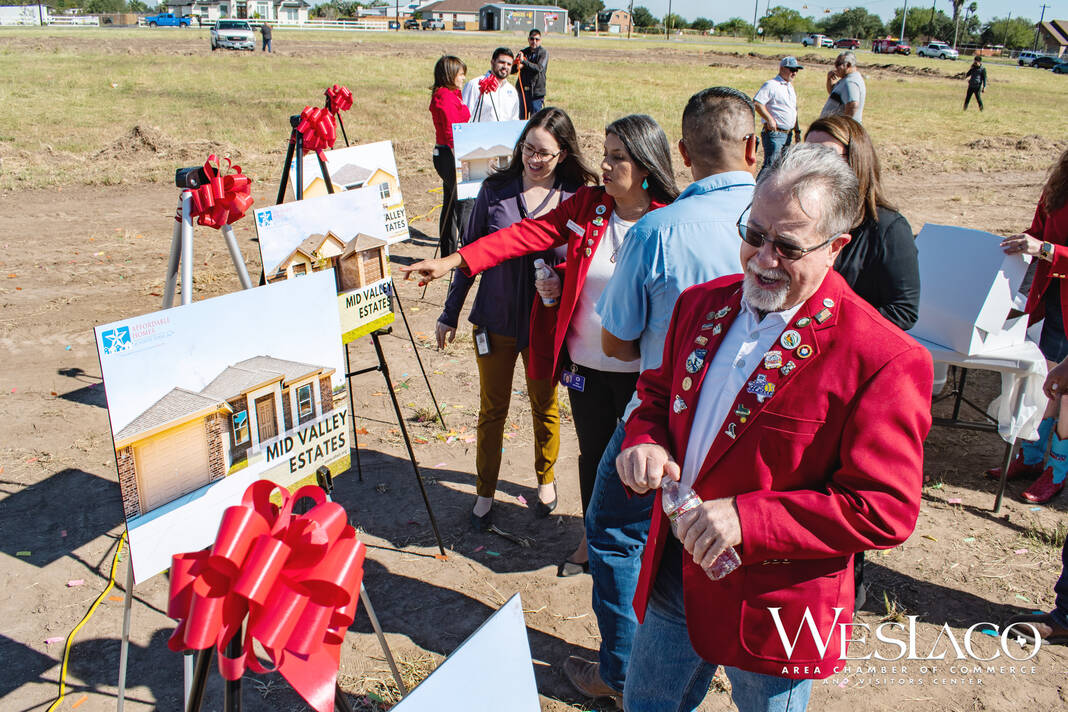
A promise of homeownership for low-income families lay germinating in a barren Weslaco field for nearly 14 years until Thursday, when three nonprofits gathered to break ground on a unique private-public partnership that promises to benefit families and improve the local economy.
The Weslaco Housing Authority had big plans in 2008 for the grassy property sitting at the southwest corner of Milanos Road and 18th Street.
But the great recession hindered those plans and affected the nonprofit’s funding, Jorge Piña, the executive director for Weslaco Housing Authority, said Thursday.
It wasn’t until several years later that an opportunity sprung.
“Several years ago, we met with Weslaco Housing Authority trying to find ways to partner,” Robert Calvillo, the executive director at Affordable Homes of South Texas, recounted. “And they said, ‘Well, you know, actually, we own the property that we’re trying to sell, and we want to put it to good use.’ And so that’s how we got started. It’s been a long process, but it worked.”
Affordable Homes of South Texas is a nonprofit that develops and builds homes, as well as a mortgage lender for low-income families hoping to move from renting to owning.
For years, the organization built homes on various properties throughout Weslaco, but it had more ambitious plans: building an entire subdivision.
Affordable Homes wanted to acquire the land, but it had to be bought at a fair market price, or about $640,000, according to federal guidelines.
It could’ve been sold at a much higher cost, housing officials said, but they were keen on selling to someone who would nurture their mission.
Still, the price was high.
That’s where Lynn Carter, who sits on the board of directors for the Knapp Community Care Foundation, came in.
“I was kind of the squeaky wheel,” Carter admitted Friday. “I started hearing about alternatives to investing or alternative ways to invest.”
The Knapp Foundation, which is affiliated with Knapp Medical Center in Weslaco, was looking at creative ways to invest in the mid-Valley area, and Carter heard of foundations, like hers, that were employing “impact investing.”
She heard the term during a conference a few years ago, about the same time Affordable Homes of South Texas was partnering with the housing authority.
“This is a little bit different way of investing your money,” Carter said. “You have the opportunity to carve out a little bit of your investing money — and we’ve carved out about $3 million to set aside for just impact investing — where you provide low interest loans to local nonprofits. So, you’re not only doing wonderful work in your own community, but then you also get a little bit of a return on your money.”
Knapp invested $1 million dollars on Affordable Homes of South Texas.
And though the organization focuses on improving healthcare access, the project was not a departure from its mission.
“We are investing in social determinants of health, and housing is definitely a part of that,” Carter said.
The funding helped Affordable Homes of South Texas start the project even though this year’s housing market proved challenging.
Calvillo said production for Affordable Homes was reduced from 40-50% in the last couple of years.
The organization typically builds and mortgages about 100 homes per year, but the pandemic and its effects, which did not spare nonprofit organizations helping low-income families, affected their bottom line, too.
“Our home costs have increased about 40%, just as (Proyecto) Azteca had mentioned,” Calvillo added, referencing a Monitor story where Proyecto Azteca explained the productivity problems.
But on Thursday, a row of shovels stuck out from the split earth like budding weeds breaking through tough ground, finally signaling progress.
The project aims to build the Mid-Valley Estates for 114 single-family homes. Most designs will include three-bedrooms and two baths and will cost about $120,000 — higher than the $80,000 price tag from a few years ago, but less than half of the average home price in the area.
Multi-home housing will also be created to accommodate 44 four-plex units, a different kind of construction that deploys a creative work-around to the rising cost of supplies and labor.
“One of the unique things about this subdivision that we’re going to do to help overcome the cost is we’re developing a portion of it to be multifamily units rentals,” Calvillo said. “We’re going to sell those lots to the private sector, to an individual investor, whoever is interested in buying, and the proceeds for that (are) going to reduce the cost of the lots for our families. So it’ll be an additional subsidy that the families will be able to get coming from the community.”
The development of the rural space is also a benefit to another partner, Hidalgo County.
“The use of the land is important, because it drives the growth around here,” David Fuentes, Hidalgo County Precinct 1 commissioner, said. “You see more schools popping up, you see more stores, you see more retail, all of those types of things. So for us the significance is great, because we continue to see our population and our community grow.”
Homes are projected to be available by next summer, but construction faces delays, particularly with underground infrastructure.
The strained supply chain is responsible for the late delivery of concrete piping. And construction crews are waiting for a nearby neighborhood to finish moving its water lines so the new Mid-Valley Estates lines can be built, aligned and connected properly.
Still, partners are focused on the seeds planted over a decade ago that will finally bear fruit.
“I think the American dream is not to rent a home,” Calvillo said. “The American dream is to own your own home. And so we’re continuing to fight for that.”



